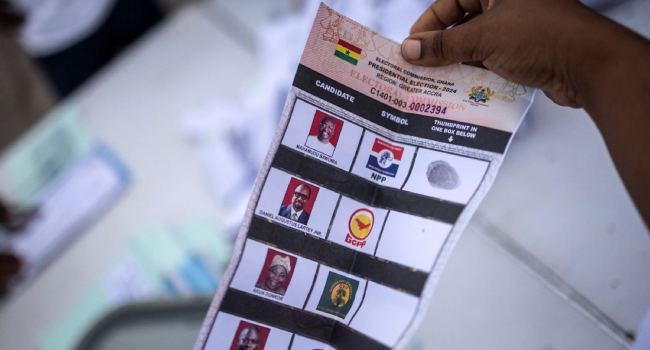Ghana began counting ballots on Saturday following a closely contested election, with the ruling party’s Vice President, Mahamudu Bawumia, seeking to overcome widespread frustration over economic difficulties and fend off a challenge from opposition candidate and former president, John Mahama.
Economic struggles were at the forefront of the election, as the West African nation, a major producer of gold and cocoa, has faced a debt default, high inflation, and a $3 billion IMF bailout deal.
Voters were selecting a successor to President Nana Akufo-Addo, who is stepping down after serving the constitutional limit of two four-year terms. Parliamentary seats were also up for election.
While voting was largely peaceful, a tragic incident occurred at a polling station in Nyankpala, in the northern region, where one person was shot dead, and four others were arrested, according to police and local media.
Once polls closed at 17:00 GMT, electoral teams began counting ballots under the supervision of political party agents, with results being sent to collation centres. Preliminary outcomes are expected early on Sunday, with full presidential results anticipated by Tuesday.
“Everyone is complaining that prices are too high. I want change—I want a president who will bring improvement,” said Abdullah Mohammed, a student who voted in Accra’s Nima district.
Political Landscape
Ghana has a long-standing reputation for political stability, with its two dominant parties, the New Patriotic Party (NPP) and the National Democratic Congress (NDC), alternating in power since the return to multi-party democracy in 1992.
The ruling NPP campaigned on the slogan “Break the 8,” referencing their ambition to secure an unprecedented third term in office. However, Bawumia has struggled to distance himself from criticism of Akufo-Addo’s handling of the economy.
“I believe our message has resonated with the people,” Bawumia said after voting in his hometown of Walewale.
An economist with a UK education and a former central banker, Bawumia has highlighted economic recovery efforts, plans for digitalisation, and ongoing free education and healthcare initiatives as key accomplishments.
Economic Concerns
Despite a decline in inflation from over 50% to approximately 23% and signs of macroeconomic stabilisation, many Ghanaians continue to grapple with the high cost of living, limited job opportunities, and a weakened cedi currency.
These economic frustrations have paved the way for Mahama to mount a comeback. The NDC candidate, who served as president from 2012 to 2017 but lost in two subsequent elections, has promised to “reset” Ghana’s economy. His proposals include creating a “24-hour economy” to boost job opportunities and renegotiating elements of the IMF bailout.
“Unlike previous elections, the direction of this one is evident due to the poor performance of the Akufo-Addo-Bawumia government,” Mahama said after voting in his hometown.
While some analysts see Mahama as having an advantage due to dissatisfaction with the NPP, he still faces criticism over financial troubles and widespread power outages that characterised his presidency.
Divided Sentiment
For some, like shoe saleswoman Esther Adobea, the economic challenges are undeniable, but she remains hopeful about Bawumia’s potential. “Our economy is not in a good place, but I believe he can improve things,” she said.
Both major candidates hail from the northern regions, traditionally an NDC stronghold but increasingly politically fragmented, making it a crucial battleground in this election.
Broader Challenges
Beyond economic issues, Ghana faces growing risks of spillover from jihadist conflicts in neighbouring Niger and Burkina Faso, as well as the environmental and economic consequences of illegal gold mining. Despite pledges to tackle the issue, the illegal mining trade has expanded, polluting waterways and affecting cocoa farms, a vital export sector.



